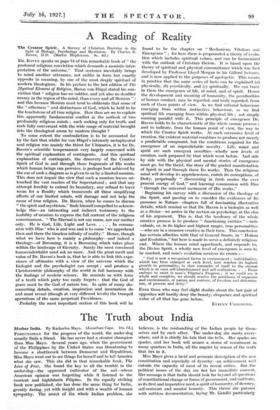The Truth about India
Mother India. By Katherine Mayo. (Jonathan Cape. 10s. 6d.)- FORTUNATELY for the progress of the world, the under-dog usually finds a friend. He has never had a stouter champion than Miss Mayo. Several years ago, when the government of the Philippines by the United States was threatening to become a shuttlecock between Democrat and Republican, Miss Mayo went out to see things for herself and to tell America what she saw. This she did in that remarkable book, The Isles of Fear. She found the key to all the trouble in the under-dog—the oppressed cultivator of the soil—whom American opinion was forgetting while it listened to the esurient and highfalutin Filipino. In the equally striking book now published, she has done the same thing for India, gi e,atly daring, yet with insight and with a wealth of human sympathy. The secret of the whole Indian problem, she
believes, is the mishandling of the Indian people by them- selves and by each other. The under-dog she meets every- where, and it is chiefly his tale that she teas. Her spades are spades, and her book will arouse a storm of resentment in many quarters in India, all the angrier by reason of the truth that lies in it.
Miss Mayo gives a lucid and accurate description of the new constitution and especially of dyarchy—an achievement well outside the capacity of most of its recent critics. But the political issues of the day are not her immediate concern. Her message is that India should look far beyond all questions of constitutional change or forms of government, and cultivate, as its first and imperative need, a spirit of humanity, of decency, self-restraint and mental honesty. This theme she pursues with ruthless documentation, laying Mr. Gandhi particularly
under contribution, in his agonies of remonstrance against the weaknesses of his own people. And this is her conclusion : " The only power that can hasten the pace of Indian develop- ment towards freedom beyond the pace it is travelling to-day, is the power of the men of India, wasting no more time in talk, recriminations, and shiftings of blame, but facing and attack- ing, with the best resolution they can muster, the task that awaits them in their own bodies and souls."
As might be expected from such a proem, there is much strong meat in the book. From a steady level of outspoken- ness, three of its chapters stand out as nothing less than appalling :—Chapter V., on the effects of child-marriage (" the wife whom I saw, mother at nine and a half, by Caesar- ean operation, of a boy weighing one and three-quarter pounds ") ; chapter XX., on the treatment of dumb animals (" I recently saw an old cow lying helpless, being consumed by maggots which had begun at her hind-quarters. It would take them ten days to eat up to her heart and kill her. Till then she must lie as she lay ") ; and chapter XXVI., on sanitation (" The river banks " at Benares " are dried sewage ; the river water is liquid sewage. The faithful millions drink and bathe in the one, and spread out their clothes to dry upon the other "). The gynaecological chapter (VIII.), which gives its name to the book, is even more horrible ; and the worst of it is that it is true.
The picture is, of course, highly coloured, the indictment too sweeping. There are plenty of Indians, of all classes and creeds, who are good to their wives, devoted to their daughters and humane to their cattle. But the evils which Miss Mayo attacks are widespread and deep-rooted. Until they are seriously and actively combated by an enlightened public opinion in the country itself, India can hardly hope to take the place that she ought to occupy in the family of nations. It is in this labour that the continued co-operation of the British is indispensable ; and if on that point Miss Mayo can convince some of the thoughtless enthusiasts who rant about immediate emancipation, she will have rendered valuable service.
MESTON.











































 Previous page
Previous page